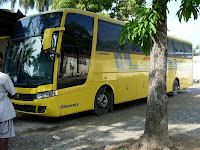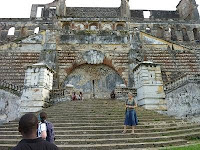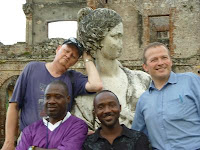We have come to Haiti as the guests of the Evangelical Church of Haiti. It was Robyn's dream, vision or inspiration (call it what you like) for the church to provide a gift of physiotherapists, surgeons and anaesthetists to the people of Cap Haitien in general, and the hospital of St Justinien in particular. And as such the group is necessarily Christian.
Personally I had come with the intention of being entirely "medical" - in that I did not choose to preach or be involved in church work here other than as a member. In fact before coming I had briefly tried to contact the Anglican (or Episcopalian) Bishop to tell him I was coming, but could only receive an "out of office" reply to my e-mail.

However on my first day working in the hospital I was contacted by Pere Noe - Father Noah - of the Episcopal Church who was looking forward to meeting me, and so at 8.00am the next day Robyn and I went to his church.
He is a youngish man (I find in many cases I cannot accurately guess the Haitian's ages - usually putting them several years below their actual years: is this because they are naturally young looking? Or is it to do with a lack of smoking?) But my guess is that Noe must be in his 40s. He is married with three daughters and speaks very good English. Following the earthquake, and largely because of fear of further ones affecting Cap Haitien, his wife and daughters moved to the United States and he sees them only occasionally - but he assures me he speaks with them most days. The Episcopal church is very near to where Robyn lives, and the cross on the top can be seen from the balcony. The church is next to a secondary school which Pere Noe has built up in his time here.
I was impressed that we were stopped as we tried go in by a security guard - it is not just the foreigners who are targets for kidnappers - and we were escorted to Pere Noe's office.
Pere Noe is also responsible for a Technical College offering courses in mechanics, electronics and other fields.
As well as being the Parish Priest in Cap Haitien, Noe is also the Archdeacon for the area and looks after a number of churches up to three hours drive away. The Episcopal church is not big in Haiti and so there are not enough priests to cover the whole area.
I was invited to come to church, and accepted, being able to come on the second Sunday - there being two morning services at 6.30 and 8.30am, I would be able to go the Robyn's church at 6.00, and then make an early exit and go to the Anglicans afterwards.
That second Sunday dawned early - and by 5.15 am we were being driven to Robyn's in time for the 6.00 start.
If anything it seemed more crowded than the previous week - but we were able to be seated near enough to the front for Ross to be welcomed this time.
Two different worship groups led the singing - one of them being an all male choir with some
very striking melodies and harmonies. Again the bible was honoured as we all stood to hear the readings, and as before the second one from the New Testament was read by the reader and
congregation by alternate verses.
Pastor Megy chose to preach from Numbers 5. 11-31; which is a passage I have never heard preached from before! Please read it for yourself to see what I mean.
The service was to be followed by communion - which is taken very seriously amongst the church, and follows a Presbyterian tradition of completing communion cards, and being made
ready to come. And as we arrived there was a long queue of people wanting to return their cards before the service began.
As I had a further church to go to, I chose to leave just before the communion part of the service. And was later very touched to hear that Pastor Megy had told the congregation where I was going and that he also prayed for me going there.
And as I made my way out it struck me just how well attended the church was. It took me 10 minutes or more to leave, just because of the numbers of the people. They were sitting and standing on the stairs, and some were going and some were coming, and although eventually the door came into view, it took a long time to reach it. And for me who is not good in confined places, it took a bit of self-control not to feel some panic at not being able to get out! Sadly I found myself starting to ruminate on what might happen if someone fell over on the stairs, or even if an
earthquake was felt.....
Outside the church the crowds dispersed, and dodging the roadworks I made the short distance
to The Episcopal Church.
I am slightly ashamed to admit a certain sense of relief on entering the building: partly because it was familiar - with a central altar, a smell of incense and a choir/music group practising. But also was it because, like quite a few Anglican churches, there were not many of the congregation there!
Certainly in my own church in York, with 5 minutes to go before the service starts the building can feel half empty, and suddenly everyone arrives... To a similar degree the same happened here, and by the time came for the start about 180 people were there. But initially not to feel so
pressed in was a relief.
Pere Noe invited me to robe with him, and to con-celebrate the Mass. I was slightly anxious about the heat, and wearing my clothes and wearing a cassock alb and stole - but was happy to accept the invitation.
The Mass was in Creole - but I was assigned a service order and a hymn book. Pere Noe preached - following the Revised Common Lectionary, but I fear most of his points were above
my grasp of the language.
We then moved to the peace - and it was very emotional for me to move through the congregation sharing peace, and to meet up with colleagues from the hospital too.
The con-celebration went well, my knowledge of the liturgy combining with a basic understanding of French/Creole made me feel I could say the words with integrity.
Administration was unexpected - I held the chalice, walked next to Noe who had the bread, and as we came to people he gave me a wafer to intinct and then to give to the communicants. It seems like anyone who could walk received the elements.
At the end of the administration Noe handed me an oil stock and said that some of the congregation might come forward for anointing: and they all did. I resorted to the English language this time, having at the administration of communion tried to mumble what I thought the French/Creole for the "body and blood of Christ" was, grateful for a God who is above every race, nation and tongue, and all were anointed in the name of the Father, Son and Holy Spirit, with the prayer that Jesus Christ might be real to them and to fill them with his Holy Spirit. When this was finished - and it took some time - I asked Noe to anoint me, and I anointed him.
(I need not have worried about the heat - and on this score the Episcopal Church wins hands
down - the fans were blowing a near gale, and with no power cut, it was almost balmy!)
After worship, and by now ready for breakfast, it was a joy to come to the Robyn's home and
partake of a brunch made up of pumpkin soup (more of a stew really) and coffee.
On both Sundays in the afternoon we have adjourned to a hotel for rest and a swim. And even though I am not much of a swimmer there is something wonderful about immersing ourselves in the cool water - even if there is a degree of soupiness to the water quality.

This Sunday we went to Mont Joli hotel - which is expensive and relatively luxurious, but was also the host to a local Christian Missionary Radio Station which was holding it's 60th Year anniversary of existence. The Christian world being as small as it is meant that Robyn knew a lot of those attending - including a number who had flown back from the USA and Canada just for the event, and so she was in the position of having to speak to many people all dressed in their Sunday best, while she (and the other three of us) were all in our swimming gear! Photos best not wanted here!



 The coach line operates daily, with the incoming service arriving in Cap Haitien late in the afternoon. The coach is locked away in a compound over night, and departing passengers are invited to assemble at 8.00am. Tickets are checked, baggage is tagged and loaded, and we are invited to board. The coach is designed to hold over 50 passengers, but it seems like we are less than 20. All of us, if we want it, can get a window seat, and on some signal (which wasn't able to discern) the coach leaves, and so I begin my journey back to the UK.
The coach line operates daily, with the incoming service arriving in Cap Haitien late in the afternoon. The coach is locked away in a compound over night, and departing passengers are invited to assemble at 8.00am. Tickets are checked, baggage is tagged and loaded, and we are invited to board. The coach is designed to hold over 50 passengers, but it seems like we are less than 20. All of us, if we want it, can get a window seat, and on some signal (which wasn't able to discern) the coach leaves, and so I begin my journey back to the UK.












 A couple of photos to try and support my claim that I have been in theatre most days! And that the sun-tan has come from incidental exposure rather than anything planned. I am pictured with Drs Nadine Compet and Jo-Ann Jean-Louis. They are both residents - Nadine has 2 years experience and Jo-Ann 2 weeks! In the other picture is Dr Carmel Leconte - chief Anaesthetist, and only permanent member of the anaesthetic staff. She originally came from Port-au-Prince, but after her marriage she came to the north of the country. Her husband is the head of Obstetrics and Gynaecology at St Justinien.
A couple of photos to try and support my claim that I have been in theatre most days! And that the sun-tan has come from incidental exposure rather than anything planned. I am pictured with Drs Nadine Compet and Jo-Ann Jean-Louis. They are both residents - Nadine has 2 years experience and Jo-Ann 2 weeks! In the other picture is Dr Carmel Leconte - chief Anaesthetist, and only permanent member of the anaesthetic staff. She originally came from Port-au-Prince, but after her marriage she came to the north of the country. Her husband is the head of Obstetrics and Gynaecology at St Justinien. 


 Sundays are fast becoming my favourite day in Haiti. Which is a bit of a confession as on Sundays we generally don't go to the hospital, or look into theatre. The day starts early. Up before sunrise - at round about 4.30 am, shower or wash, depending on the water situation - further confessions: I usually pray for a shower! But without becoming too detailed it is amazing how little water it takes to wash body and hair. (And not wanting to waste the water - it goes into the toilet cistern.)
Sundays are fast becoming my favourite day in Haiti. Which is a bit of a confession as on Sundays we generally don't go to the hospital, or look into theatre. The day starts early. Up before sunrise - at round about 4.30 am, shower or wash, depending on the water situation - further confessions: I usually pray for a shower! But without becoming too detailed it is amazing how little water it takes to wash body and hair. (And not wanting to waste the water - it goes into the toilet cistern.)






















 a groaning and whirring, and hopefully water is pumped into the tank. However it is clearly a big drain on power, as the fuse-box on another wall gets incredibly hot very quickly... So to try and keep the water levels satisfactory I try and use the pump for a series of short bursts.
a groaning and whirring, and hopefully water is pumped into the tank. However it is clearly a big drain on power, as the fuse-box on another wall gets incredibly hot very quickly... So to try and keep the water levels satisfactory I try and use the pump for a series of short bursts.
